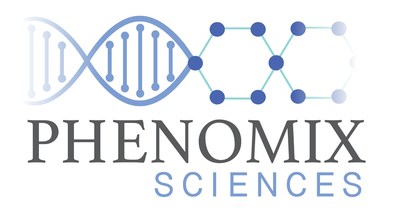Mayo Clinic Study Uses Phenomix AI Algorithm to Predict GLP-1 Side Effects, Advancing Personalized Obesity Care and Drug Development
Study presented at DDW 2025 finds genetic risk scores can identify patients at higher risk of nausea from GLP-1 therapies, supporting the development of more targeted treatment decisions and advancing pharmaceutical R&D.
MENLO PARK, Calif., May 7, 2025 /PRNewswire/ -- Phenomix Sciences (Phenomix), the first commercial precision obesity medicine biotechnology company, in partnership with Mayo Clinic researchers, presented new findings at Digestive Disease Week (DDW) 2025 showing its proprietary machine-learning algorithms can predict which patients are more likely to experience side effects, specifically nausea, from GLP-1 therapies.
The research, led by renowned obesity researcher and Phenomix co-founder, Andres Acosta, MD, PhD, and presented by Thomas Fredrick, MD, marks an important step toward more personalized obesity care and improved clinical trial design to support drug development.
The study titled, "A Genetic Risk Score Associated with Nausea Resulting from GLP-1 Agonist Treatment: A Post-Hoc Analysis of a Randomized Controlled Trial of Liraglutide," analyzed post-hoc genetic data from 110 participants. Using a machine learning-assisted Genetic Risk Score (GRS), researchers analyzed the relationship between individual genetic profiles and adverse events, including nausea. Patients with a high GRS were more than twice as likely to experience nausea from liraglutide, a GLP-1 medication, compared to those with a low score (68% vs. 30%).
Nausea is the most common side effect of GLP-1s like liraglutide, with up to 40% of patients experiencing it and up to 6.4% stopping treatment because of it. This kind of predictive insight helps reduce waste, prevent avoidable ER visits, and ensure patients are matched with medications they can tolerate from the start. It also has implications in pharmaceutical development, improving participant selection and retention in clinical trials, and accelerating time to market.
"These findings represent a meaningful advancement in how we approach obesity treatment at an individual level," said Dr. Acosta. "By identifying which patients are more likely to experience side effects before starting therapy, we can improve tolerability, support long-term adherence, and better match the right treatment to the right patient. This is a critical step toward delivering on the promise of truly personalized obesity care."
Previous research presented by Phenomix at DDW 2024 demonstrated that Phenomix Sciences' MyPhenome® test can identify patients more likely to respond to semaglutide. MyPhenome is a simple saliva swab that determines the root biological factors that can cause obesity and helps physicians personalize treatments for more effective weight loss. This year's findings zero in on the patients who may see optimal weight loss but still experience treatment-limiting side effects.
"Our team's research builds on previous findings by showing we can now predict not just who will benefit from GLP-1s, but who is more likely to struggle with side effects," said Thomas Fredrick, MD. "That allows for more balanced, individualized treatment planning. It's an important advancement in the clinical application of precision obesity medicine."
"This study underscores the power of predictive tools like MyPhenome to transform how we approach obesity treatment — not just in the clinic, but in the drug development pipeline," said Mark Bagnall, CEO of Phenomix Sciences. "By identifying patients at risk for side effects before treatment begins, we can match the right patient to the right therapy, increase real-world adherence, and dramatically improve clinical trial efficiency through smarter patient selection. Our strategic partnership with Mayo Clinic, and its dedicated research team including Drs. Acosta and Frederick, have been critical in validating this precision medicine approach."
The study was one of 17 presented by Mayo Clinic researchers, with eight incorporating Phenomix's machine learning-based algorithms. Together, the research highlights the growing role of precision medicine in advancing obesity care and drug development.
The study was co-authored by Dr. Fredrick; Jessica Atieh, MD; Daniel B. Maselli, MD; Diego Anazco, MD; Lizeth Cifuentes, MD; Maria A. Espinosa, MD; Jose Villamarin, MD; Deborah Eckert BSN; Serban Ciotlos PhD; Timothy O'Connor PhD; Michael Camilleri, MD, DSc; and Andres Acosta, MD, PhD.
For more information about Phenomix Sciences and supporting research, visit: phenomixsciences.com. To see a full list of the studies presented at DDW, click here.
About Phenomix Sciences
Phenomix Sciences is a precision obesity biotechnology company transforming obesity care by putting patients at the center of therapeutic innovation. Through proprietary genetic testing, advanced analytics, rich clinical data, and technology exclusively licensed from Mayo Clinic, Phenomix delivers individualized insights into how patients respond to specific weight loss interventions. These insights not only inform clinical decision-making for patients but also help pharmaceutical and medical device partners refine trials, identify high-responder populations, and accelerate the development of more targeted, effective therapies. By aligning patient biology with drug discovery, Phenomix is shaping a more personalized and impactful future for obesity treatment. Phenomix is backed by Health2047, the innovation arm of the American Medical Association, which helps startups transform bold ideas into solutions that change healthcare for the better. Learn more at www.phenomixsciences.com.
Media Contact:
phenomix@ampublicrelations.com
![]() View original content to download multimedia:https://www.prnewswire.com/news-releases/mayo-clinic-study-uses-phenomix-ai-algorithm-to-predict-glp-1-side-effects-advancing-personalized-obesity-care-and-drug-development-302448298.html
View original content to download multimedia:https://www.prnewswire.com/news-releases/mayo-clinic-study-uses-phenomix-ai-algorithm-to-predict-glp-1-side-effects-advancing-personalized-obesity-care-and-drug-development-302448298.html
SOURCE Phenomix Sciences


